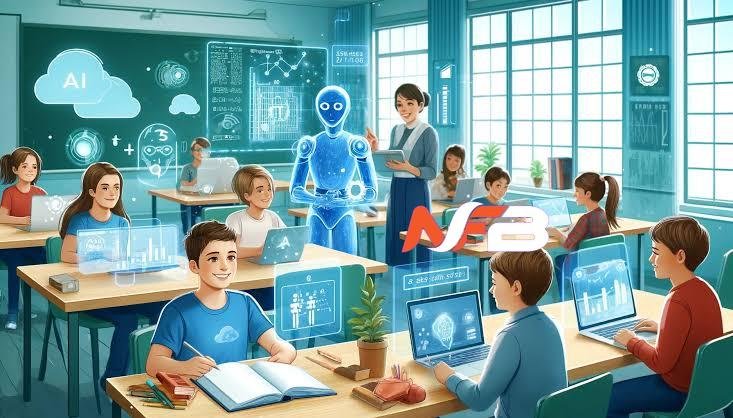As technology continues to advance at a rapid pace, the education sector is embracing innovative tools to enhance learning experiences. One of the most exciting developments in recent years is the integration of chatbots into classrooms across the United Kingdom. These artificial intelligence-powered assistants are revolutionizing the way students learn and teachers teach, offering personalized support and opening up new possibilities for educational success.
Understanding Chatbots in Education
Chatbots are computer programs designed to simulate human conversation. In the classroom, they can act as virtual tutors, providing instant answers to students’ questions, offering explanations on complex topics, and even guiding learners through problem-solving exercises. The beauty of chatbots lies in their ability to adapt to each student’s unique learning style and pace, ensuring that no one is left behind in their educational journey.
The Shift in Educational Paradigm
The introduction of chatbots in UK classrooms is not just a passing trend. It represents a fundamental shift in how we approach education. These AI assistants can work tirelessly, providing round-the-clock support to students who might struggle outside of regular school hours. They can also help teachers by taking on some of the more routine tasks, such as answering frequently asked questions or providing basic explanations, allowing educators to focus on more complex aspects of teaching and mentoring.
James Heartquist, Founder of Modern Property Solutions, shares his thoughts on the matter: “I’ve seen firsthand how technology can transform industries, and education is no exception. Chatbots in classrooms are game-changers. They offer personalized learning experiences that were once unimaginable. In my experience, success comes from embracing innovation while maintaining a human touch. I believe chatbots can free up teachers to focus on what they do best – inspiring and guiding students. It’s an exciting time for education, and I’m eager to see how these tools will shape the future of learning.”
Challenges and Opportunities
While the potential benefits are significant, the integration of chatbots in education is not without its challenges. There are concerns about data privacy, the potential for over-reliance on technology, and the need for human interaction in the learning process. However, many experts believe that the benefits of chatbots in education far outweigh the potential drawbacks. With proper implementation and oversight, chatbots can become powerful tools in the arsenal of modern education.
The Potential of AI in Education
The potential of AI in education extends far beyond simple question-answering. Advanced chatbots can analyze a student’s learning patterns, identify areas where they might be struggling, and suggest tailored exercises to help them improve. This level of personalization was once the domain of expensive one-on-one tutoring, but chatbots are making it accessible to all students, regardless of their background or resources.
Adam Seguin, Head of Acquisitions at Myrtle Beach Home Buyers, offers his perspective: “In my years of experience, I’ve learned that adaptability is key to success. The same applies to education. Chatbots in classrooms represent a shift towards more flexible, personalized learning. I’ve seen how technology can streamline processes in real estate, and I believe it can do the same for education. These AI tools can help level the playing field, giving every student the support they need to excel. It’s not about replacing teachers, but empowering them to do more.”
Creating Inclusive Learning Environments
Moreover, chatbots can help create a more inclusive learning environment. For students with learning disabilities or those who speak English as a second language, chatbots can provide patient, judgment-free assistance. They can repeat explanations as many times as needed, adjust their language to suit the student’s level of understanding, and even translate content into different languages.
Preparing Students for a Tech-Driven Future
One of the most compelling arguments for integrating chatbots into UK classrooms is the need to prepare students for a future where AI and other advanced technologies will play an increasingly prominent role. By interacting with chatbots from an early age, students can develop digital literacy skills that will be crucial in their future careers.
Furthermore, the use of chatbots can help foster important soft skills such as critical thinking and problem-solving. As students learn to formulate questions clearly and interpret the chatbot’s responses, they’re developing communication skills that will serve them well in any field they choose to pursue.
Tornike Asatiani, Founder of Edumentors, weighs in on this aspect: “At Edumentors, we’re always looking for innovative ways to support students. Chatbots in classrooms align perfectly with our mission. I’ve seen how personalized tutoring can transform a student’s academic journey. Now, imagine that support available 24/7 through AI. It’s not about replacing human interaction, but enhancing it. We’re preparing students for a world where AI is ubiquitous. By integrating chatbots into education, we’re giving them a head start. It’s an exciting development that I believe will yield fantastic results.”
The Road Ahead: Balancing Technology and Human Touch
As we look to the future of education in the UK, it’s clear that chatbots and other AI technologies will play an increasingly important role. While they may never replace the invaluable human elements of teaching and learning, these tools have the potential to significantly enhance the educational experience for students and teachers alike.
The key to successful integration lies in striking the right balance between technological innovation and the irreplaceable human aspects of education. Chatbots should be seen as tools to augment and support teachers, not replace them. By freeing up teachers from routine tasks, chatbots can allow educators to focus on higher-level instruction, mentoring, and the social-emotional aspects of learning that are crucial for students’ overall development.
Conclusion: Embracing a New Educational Frontier
The integration of chatbots into UK classrooms represents a bold step into the future of education. It’s a future where personalized learning is the norm, where no student is left behind, and where teachers are empowered to focus on what they do best – inspiring and guiding the next generation.
As we continue to navigate this new educational landscape, one thing is certain: the classrooms of tomorrow will look very different from those of today, and chatbots will be at the forefront of this exciting transformation. By embracing these technologies thoughtfully and responsibly, we can create an educational system that is more engaging, more inclusive, and better equipped to prepare students for the challenges and opportunities of the 21st century.
The journey towards fully integrating chatbots into UK classrooms is just beginning, but the potential benefits for students, teachers, and society as a whole are immense. As we move forward, it will be crucial to continue researching, refining, and adapting these technologies to ensure they serve the best interests of learners and educators alike. The future of education is here, and it’s powered by AI.











Leave a Reply